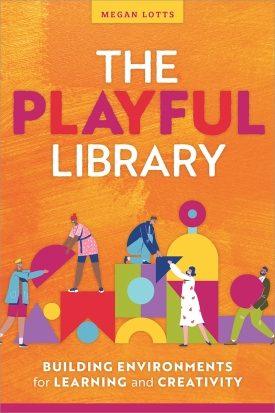Primary tabs
You don't need to be an ALA Member to purchase from the ALA Store, but you'll be asked to create an online account/profile during checkout to proceed. This Web Account is for both Members and non-Members. Note that your ALA Member discount will be applied at the final step of the checkout process.
If you are Tax-Exempt, please verify that your account is currently set up as exempt before placing your order, as our new fulfillment center will need current documentation. Learn how to verify here.
- Description
- Table of Contents
- About the author
- Reviews
This book demonstrates the ways in which cultivating a sense of play in library work fosters flexibility, creativity, innovation, teamwork, and increased patron and community engagement.
Play is a state of mind, and a means to have fun, explore wild ideas, and get lost in “the flow.” Not only does play make library work more enjoyable and less stressful, it can also help us do our jobs better—while making the library a much more engaging and delightful presence in the community at large. Regardless of your age, background, or comfort level, you can use a playful mindset to jumpstart your organization’s initiatives, programs, and services. As you follow this book’s roadmap, you will
- be introduced to the fundamentals of play, come to see why it remains so important even for adults, and get advice on overcoming some of the common obstacles that organizations face in incorporating play;
- explore your own personal relationships with play, using reflection prompts in each chapter;
- learn about dozens of examples of the many unexpected spaces where play can be found, encompassing public libraries, academic libraries, museums, and other settings;
- understand how playfulness can be harnessed to improve learning, teaching, engagement, and assessment in a variety of different contexts;
- read about the ins and outs of games in libraries, with profiles of several successful programs and game collections that will serve as inspirations for your own library or organization;
- find out why low-risk, high-impact making activities and makerspaces can be powerful initiatives for libraries to expand their reach;
- learn how libraries can work together with their constituents to build healthier and more welcoming communities, using play to reflect culture and history while honoring diversity; and
- gain an appreciation for the power of “playing at work” to feel relaxed, keep flexible, and joyfully collaborate with your colleagues.
Preface
Acknowledgements
Introduction: Jumping Into Play
Chapter 1 What is Play?
Chapter 2 Where is Play
Chapter 3 Assessment & Teaching
Chapter 4 Health & Wellness
Chapter 5 Playful Employees
Chapter 6 Games & Play
Chapter 7 Making culture
Chapter 8 Connecting Communities
Conclusion: Embracing the Unexpected
Appendix: Related Reading by Megan Lotts
Index
Megan Lotts
Megan Lotts is the Art Librarian at Rutgers, The State University of New Jersey, where she regularly embraces creativity when teaching research workshops, building collections, and facilitating programming and events across the New Brunswick campuses. She has presented her research on makerspaces, play, and the work of library liaisons both nationally and internationally and has published articles in Art Documentation, portal: the Libraries in Academia, College and Research Libraries News and more. She earned an MFA (2004) and MLIS (2007) from University of Wisconsin-Madison; and a BFA in Painting (2000) and BFA in Art History (2002) from the University of Illinois- Champaign-Urbana. She currently lives in New Brunswick, NJ where she continues to explore, make, and engage in daily activities involving creativity and play.
Have you read this book? Leave a review!
"The ideas for bringing play into the workspace to avoid burnout, build teams, connect with your audiences, and simply enjoy your work are broadly applicable and the examples of how creative play is incorporated in other spaces are intriguing ... It's definitely made me think about my work habits differently in how I can approach the day playfully. I often feel like I should dive into the big things first while my brain is fresh, but beginning in play also shifts your brain into problem-solving mode but with more unexpected results (advice that reminded me of the practice of 'morning pages from The Artist's Way). Lots of good ideas here."
— Abigail Zimmer (goodreads)
"Lotts talks about the benefits of integrating play into instruction, the impact of play on health and wellness, and how playful employees contribute positively to an organization. The final chapters are dedicated to incorporating maker spaces and games (toys, board games, video games, and gamification) into libraries, thus creating community connections through play ... Emphasizing that incorporating play is not a one-size-fits-all initiative, Lotts encourages readers to scale ideas to budgetary and space requirements. While this easily digestible title is primarily for library practitioners, museum professionals and pre-service teachers would also find it useful."
— Choice



